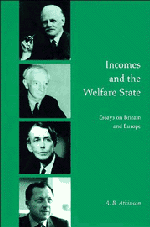Book contents
- Frontmatter
- Contents
- List of figures
- List of tables
- Preface
- Introduction
- I Income inequality and poverty in Britain and Europe
- II Analysis of the Welfare State
- 6 Is the Welfare State necessarily a barrier to economic growth?
- 7 A national minimum? A history of ambiguity in the determination of benefit scales in Britain
- 8 The development of state pensions in the United Kingdom
- 9 Income maintenance for the unemployed in Britain and the response to high unemployment
- 10 Institutional features of unemployment insurance and the working of the labour market
- 11 Social insurance
- III Targeting and the future of social security policy
- Notes
- Bibliography
- Name index
- Subject index
8 - The development of state pensions in the United Kingdom
Published online by Cambridge University Press: 03 May 2011
- Frontmatter
- Contents
- List of figures
- List of tables
- Preface
- Introduction
- I Income inequality and poverty in Britain and Europe
- II Analysis of the Welfare State
- 6 Is the Welfare State necessarily a barrier to economic growth?
- 7 A national minimum? A history of ambiguity in the determination of benefit scales in Britain
- 8 The development of state pensions in the United Kingdom
- 9 Income maintenance for the unemployed in Britain and the response to high unemployment
- 10 Institutional features of unemployment insurance and the working of the labour market
- 11 Social insurance
- III Targeting and the future of social security policy
- Notes
- Bibliography
- Name index
- Subject index
Summary
The subject of this chapter is the past and future development of state pensions in the United Kingdom (UK). It is concerned with the relation between the basic flat-rate pension and the second tier of earnings-related pensions, provided either by the state, in the form of the State Earnings Related Pension, or by employers in the form of an occupational pension, or (now) by individuals via personal pensions. The analysis is especially directed at those aspects relevant to debate about post-1992 developments in the European Community.
The Community Charter of the Fundamental Social Rights of Workers requires in the case of elderly persons that:
Every worker of the European Community must, at the time of retirement, be able to enjoy resources affording him or her a decent standard of living (para. 24).
Any person who has reached retirement age but who is not entitled to a pension or who does not have other means of subsistence, must be entitled to sufficient resources and to medical and social assistance specifically suited to his needs (para. 25).
The translation of these principles into more concrete form will doubtless be much debated, but it does not seem unreasonable to suppose that the first refers to the pension system guaranteeing a reasonable rate of replacement of individual earnings on retirement (for example, that workers can retire with a pension of at least a certain percentage of their final net earnings) and that the second ensures an overall minimum level of resources.
- Type
- Chapter
- Information
- Incomes and the Welfare StateEssays on Britain and Europe, pp. 152 - 167Publisher: Cambridge University PressPrint publication year: 1996



